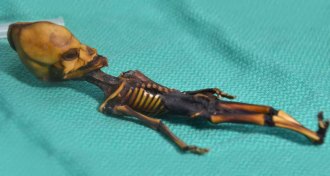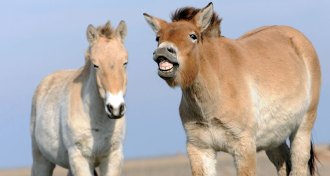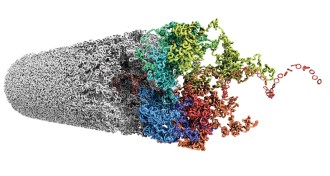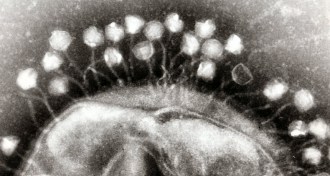Genetics
-
 Genetics
GeneticsNew genetic sleuthing tools helped track down the Golden State Killer suspect
DNA sleuths may have adapted new techniques for identifying John and Jane Does to track down a serial killer suspect.
-
 Plants
PlantsGenetically modified plant may boost supply of a powerful malaria drug
Using a DNA study and genetic engineering, researchers tripled the amount of an antimalarial compound naturally produced by sweet wormwood plants.
By Dan Garisto -
 Genetics
GeneticsCicadas on different schedules can hybridize
A new genetic study suggests that cicadas that emerge every 17 years have swapped genetic material with those that emerge every 13 years.
-
 Life
LifeLarger spleens may help ‘sea nomads’ stay underwater longer
The Bajau people of Southeast Asia have a gene variant associated with larger spleens, boosting their oxygen while breath-hold diving, researchers say.
-
 Genetics
GeneticsSweet potatoes might have arrived in Polynesia long before humans
Genetic analysis suggests that sweet potatoes were present in Polynesia over 100,000 years ago, and didn’t need help crossing the Pacific.
By Dan Garisto -
 Genetics
GeneticsBirds get their internal compass from this newly ID’d eye protein
Birds can sense magnetic fields, thanks to internal compasses that likely rely on changes to proteins in the retina.
By Dan Garisto -
 Genetics
GeneticsAtacama mummy’s deformities were unduly sensationalized
A malformed human mummy known as Ata has been sensationalized as alien. A DNA analysis helps overturn that misconception.
By Dan Garisto -
 Genetics
GeneticsThe last wild horses aren’t truly wild
The ancestor of today’s domesticated horses remains a mystery after a new analysis of ancient horse DNA.
-
 Genetics
GeneticsStudy debunks fishy tale of how rabbits were first tamed
A popular tale about rabbit domestication turns out to be fiction.
-
 Genetics
GeneticsGenes could record forensic clues to time of death
Scientists have found predictable patterns in the way our genetic machinery winds down after death.
-
 Life
LifeHere’s how cells rapidly stuff two meters of DNA into microscopic capsules
Scientists have figured out how cells quickly pack up their chromosomes before a cell divides.
-
 Genetics
GeneticsScientists find 10 new defense systems used by bacteria
Scientists identify 10 groups of genes that appear to govern defense systems used by bacteria against virus attacks.